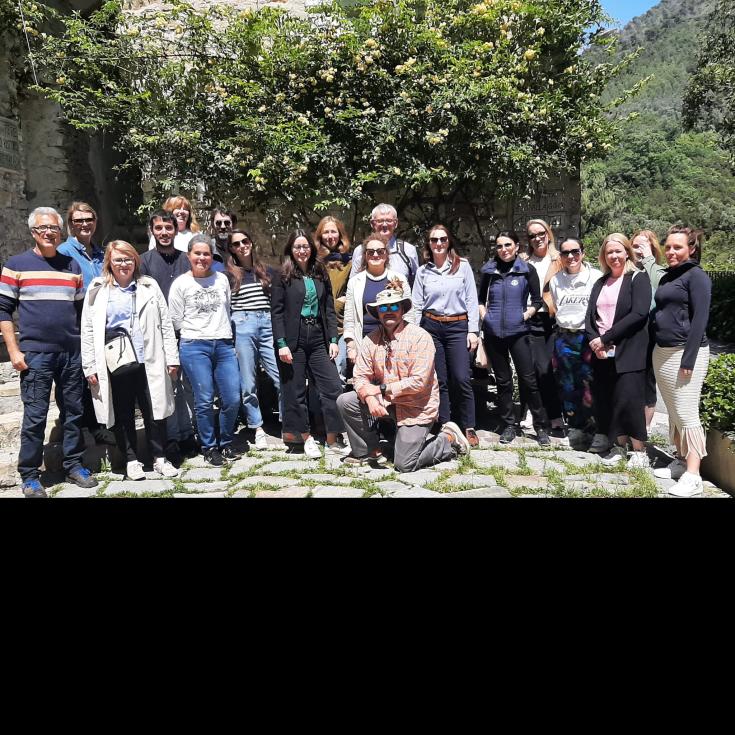Learnings gained from Genoa Study Visit
The FEEL partnership visited Genoa on the 5th & 6th May, welcomed by Laura Muraglia along with her colleagues Margherita Marre Brunenghi and Beatrice Zerega. The meeting kicked off with an introduction to the energy transition strategy in Genova focusing on the port region, renewable energy communities and European Projects.
The GOL Regional Implementation Plan is the policy instrument targeted for improvement in the Ligurian region. The GOL Regional Plan aims to create dialogue with the most vulnerable communities to further develop sustainability. By developing education and upskilling programmes, new jobs are created that protects the environment while also ensuring wellbeing and human development. The second half of the morning was spent examining some of the European Projects carried out in the Ligurian Region. These projects focused on mobility, cultural heritage, awareness raising and developing energy communities.
In the afternoon, the attendees visited some of the good practices in the city. The Luzzati Public Space and Archaeological site was an abandoned square that has been brought back into use as a space for students, youth, vulnerable of society or anyone looking for a safe space. The key aspect of the site is the no cost feature. Protecting this area and the surrounding buildings contribute to the preservation of culture, rich spaces for the community. The activities held in the space vary from psychological support, migrant initiatives, citizen services, language courses, yoga and food banks.
Next to visit was the Cicloriparo lab, a space to learn how to repair bikes. Users have access to repair equipment and help in maintenance of their bikes including spare parts where required from donated bikes. In this way, cycling is promoted and parts for bikes are shared between citizens increasing the lifetime of the materials. Alike the Cicloriparo lab, the a1Verde Association has a circular focus in its objectives along with education and environmental protection. Managed by the Association of Social Promotion, it carries out activities such as youth education in enhancing the environment, circular economy appliance repair and training on how to repair items.
The Femme Libres project, a social project funded under the Interreg Italy and France Maritime Programme. The project is to support women in vulnerable situations offering them a place to stay, work placement and security. The project led to the development of the Casa delle Donne, a socially safe place located in a socially challenging area of Genova in the historical centre.
The final visit on day one was to see the refurbishment of a collection of old greenhouses in the city. Protected from development since 2000, the space is virtually undamaged with abundant biodiversity and native plants. In 2019, the Alle Ortiche, a social promotion association moved to regenerate the space into one based on culture, environmentalism and art linking nature within the city.
Day two of the Study Visit saw the project partners visiting ARTE Imperia, the social housing regional agency in Imperia. ARTE Imperia have co-housing initiative that enables citizens share a household for a given period to allow them train and upskill. The initiative is available for struggling migrants, minors, elderly men and women. In addition, ARTE Imperia has the FEEL-GOOD Initiative, a One Stop Shop concept for disseminating energy saving tips, conscious consumption and advice on tax and reding energy bills. The FEEL-GOOD initiative was developed as a result of learning from the FEEL project.
Finally, the partnership travelled to the Eco-Village Torri Superiore in Ventimiglia. As one of the most anticipated good practice for this Study Visit, the village did not disappoint. Proving a credit to the Association’s integrity, determination and environmental focus, the village is an oasis of sustainability in a region bursting with biodiversity. Three organisations manage the village: the Torrri Superiore Cultural Association, Ture Nirvane Community Social cooperative and the resident community living in the village. The village has its own renewable generation system using thermal and photovoltaic panels as well as grow their own food. Funded mainly by the three associations, the village was renovated slowly using natural materials such as local stone, lime and insulating materials like cork and coconut fibres. The Village offers and takes part in Erasmus projects offering education and training for youth of the region. The village now is receiving funding for the future sustainable development of the village and maintenance of the cultural heritage.
As the partners return to their regions, learnings gained from the Study Visit will contribute to policy improvements and be disseminated to their regional stakeholders. Good practices such as the Feel Good initiative or the CicloRiparo lab may be adapted and imported into respective regions.

